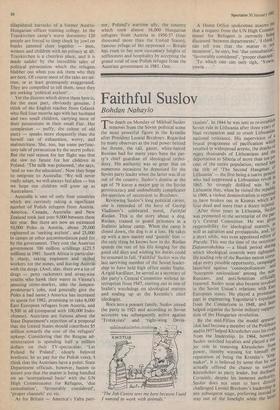Faithful Suslov
Bohdan Nahaylo
The death on Monday of Mikhail Suslov removes from the Soviet political scene the most powerful figure in the Kremlin after President Leonid Brezhnev. Regarded by many observers as the real power behind the throne, the tall, gaunt, white-haired Russian had for many years 'been the par- ty's chief guardian of ideological ortho- doxy. His authority was so great that on numerous occasions he deputised for the Soviet party leader when the latter was ill or out of the country. Suslov's demise at the age of 79 leaves a major gap in the Soviet gerontocracy and undoubtedly complicates the question of succession to Brezhnev.
Reviewing Suslov's long political career, one is reminded of the hero of Georgi Vladimov's celebrated novel, Faithful Ruslan. This is the story about a dog, Ruslan, trained to guard prisoners in a Stalinist labour camp. When the camp is closed down, the dog is at a loss. He takes up with a new master and 'guards' him the only thing he knows how to do. Ruslan spends the rest of his life longing for the good old days and wishing his duties could be resumed in full. 'Faithful' Suslov was the last surviving member of the Soviet leader- ship to have held high office under Stalin. A rigid hardliner, he served as a secretary of the party's Central Committee without in- terruption from 1947, starting out as one of Stalin's watchdogs on ideological matters and ending up as the Kremlin's chief ideologist.
Born into a peasant family, Suslov joined the party in 1921 and according to Soviet accounts was subsequently active against `Trotskyists' and 'right-wing Devia-
I wanted to work with animals.' tionists'. In 1944 he was sent to re-establish Soviet rule in Lithuania after three years °f Nazi occupation and to crush Lithuanian national resistance. His supervision of 8 brutal programme of pacification whie,", resulted in widespread arrests, the deaths 01 many thousands of Lithuanians and the deportation to Siberia of more than ten per cent of the entire population, earned him the title of 'The Second Hangman Lithuania' — the first being a tsarist gellerf" who had suppressed a Lithuanian revolt al. 1863. So strongly disliked was he ,/11,. Lithuania that, when he visited the republic in 1960, a violent demonstration is reporteu to have broken out in Kaunas which left four dead and more than a dozen injured' After three years in Lithuania, Susie/ was promoted to the secretariat of the Par' ty's Central Committee. He was given responsibility for ideological matters, well as agitation and propaganda, and, f0, a short while, was even appointed editor °I Pravda. This was the time of the notorious Zhdanovshchina — a bleak period caing, which ideological controls were tightened, the leading role of the Russian nation stress" ed at every possible opportunity, cainPalgricis launched against 'cosmopolitanism' an `bourgeois nationalism' among the non: Russians, and anti-Semitism offielahYd fostered. Suslov soon also became involve in the Soviet Union's relations with East European states. He played a prominent part in engineering Yugoslavia's expulsion from the Cominform in 1948, and later helped organise the Soviet military suppres- sion of the Hungarian revolution. By the mid-Fifties the model apParaf: chik had become a member of the Pohang' and in 1957 helped Khrushchev oust his rivals from the leadership. In 1964, however' Suslov switched loyalties and played a Mu- jor role in removing Khrushchev from power, thereby winning for himself the reputation of being the Kremlin's 'king: maker'. It is believed by some that he wa; actually offered the chance to succee0. Khrushchev as party leader, but declined' Certainly, despite his immense authoritY, Suslov does not seem to have dire
ctb; challenged Leonid Brezhnev's leadership
at
subsequent stage, preferring instead to stay out of the limelight while the larte gradually built up a personality cult around himself.
Suslov was an implacable opponent of Czechoslovak- or Polish-style reform within the Communist bloc as well as Eurocommunism. Last April, for example, he travelled to Warsaw to urge the Polish party leaders to adopt a firmer line against Solidarity. Shortly after his return to Moscow he warned that 'any deviation from our revolutionary teaching brings with it fatal consequences'. One of his last official engagements was a meeting with Polish Foreign Minister Josef Czyrek two weeks ago at which he is believed to have insisted on the need for a purge of reformist elements in the Polish party. Ironically enough, on the eve of his death, Suslov appears to have been far from happy about the state of official ideology and propaganda in the Soviet Union. In his last major speech delivered last October at a conference of social scien- tists, he blamed the unsatisfactory state of affairs on 'class enemies' who, he claimed, had unleashed a 'psychological war' against the USSR. In spite of Suslov's efforts over the years, a wide variety of Soviet spokes- men have implicitly, and sometimes expli- citly, expressed concern about the failure of ideological propaganda among young people and their increasing susceptibility to `ideologically harmful' influences from abroad.



































 Previous page
Previous page